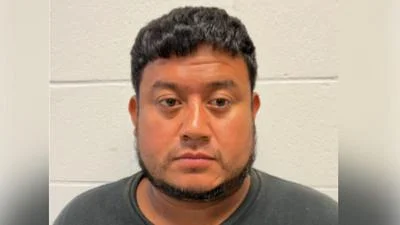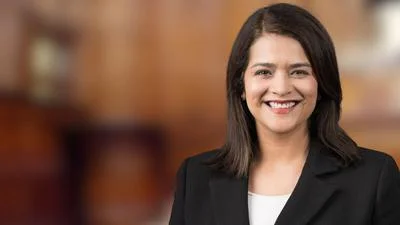Cook County State’s Attorney Kim Foxx | Facebook
Cook County State’s Attorney Kim Foxx | Facebook
Less than a year after Cook County Judge Michael McHale reduced Dante Brown’s life sentence for a double murder to 20 years — the time he had already served — Brown is back in custody, accused of shooting a security guard during an attempted robbery.
In August 2024, McHale reduced Brown’s sentence for a 2003 double murder following a petition supported by Michelle Mbekeani, then head of the Conviction Review Unit under former State’s Attorney Kim Foxx. Brown said his confession to the murders was coerced.
Mbekeani was appointed to lead the unit in late 2023 following the dismissal of longtime prosecutor Nancy Adduci. Mbekeani remained in the role for six months.

Eileen O'Neill Burke
| Eileen O'Neill Burke | Facebook
During court proceedings, Judge McHale raised concerns about a business Mbekeani operated while working in the State’s Attorney’s Office. The business, Periodsentence.com, connects incarcerated individuals who claim innocence with defense attorneys.
In a January 2024 hearing, McHale rejected Mbekeani’s explanation that the business was a project for the University of Chicago Booth School of Business, where she was enrolled in an MBA program. He described her testimony as “duplicitous.”
“One cannot represent conflicting interests or undertake to discharge inconsistent duties,” McHale said. “When the appearance of a disabling conflict is clear, a per se conflict of interest exists.”
“Unfortunately, I find that is exactly what we have here,” he continued. “A prosecutor who has a duty to vigorously represent the victims of crimes and their families cannot also, at the same time, appear to be deeply invested in working with the defense and their efforts for their clients.”
He added that Mbekeani appeared to run a for-profit corporation that had been registered in Illinois, filing annual reports, a name change, and Articles of Incorporation.
The judge concluded: “You have conflicted yourself off this case, so to speak, in addition to any other cases in my courtroom.”
During Kim Foxx’s tenure, the State’s Attorney’s Office vacated more than 250 convictions based on claims of police or prosecutorial misconduct.
Her successor, State’s Attorney Eileen O’Neill Burke, has begun reviewing petitions for Certificates of Innocence, which may lead to financial compensation following exonerations.
In August 2025, Cook County Judge Erica Reddick gave private attorney Fabio Valentini—retained by Burke’s office—two months to respond to a Certificate of Innocence petition filed by Kevin Jackson. Jackson was convicted in 2003 for the murder of 54-year-old Earnest Jenkins. He was 19 at the time and served 23 years of a 45-year sentence before his release. Jackson’s conviction was overturned during former State’s Attorney Kim Foxx’s tenure.
Attorneys representing Jackson and members of the Chicago Alliance Against Racist and Political Repression have called for the court to grant the petition. Jackson’s conviction was upheld multiple times. In 2006, the First District Illinois Appellate Court found that physical evidence supported eyewitness testimony.
In 2020, the Conviction Integrity Unit in the Cook County State’s Attorney’s Office reviewed the case and concluded no changes were warranted. In June 2024, Cook County Judge Angela Petrone denied a motion to vacate Jackson’s conviction, stating the conviction remained valid. The motion cited a special prosecutor’s report evaluating witness testimony, which formed the basis for the request to vacate. The Illinois Appellate Court later reversed that decision and ordered Jackson’s release. Foxx’s office had previously indicated it would not retry the case.
O’Neill Burke’s decision to use outside counsel to review Certificates of Innocence (COI) petitions represents a shift from previous policy. Under Kim Foxx, the State’s Attorney’s Office often did not oppose such petitions.
In a March 2025 interview with the Chicago Tribune, O’Neill Burke said her office would evaluate COI claims closely.
Burke said the statute places the burden of proving innocence on the defense in COI cases.
“We are going to do our jobs and contest it when there is a question of innocent or not innocent,” O’Neill Burke said. “Just because there are elements of that crime that we will no longer look at doesn’t mean that person is innocent. If they are, then they have to prove it in a court of law, and that’s where our system works.”





 Alerts Sign-up
Alerts Sign-up